The US is the venture-capital capital of the world, but startups and young small businesses play a lesser role in America’s economy than in many other rich nations.

America’s entrepreneurial streak as one of the things that, theoretically, is supposed to make the US exceptional as a country. At least it is if you listen to most politicians. But how does the US actually stack up with the rest of the world when it comes to building our own businesses?
The US are, in fact, pretty unexceptional.
A Start-up Rate Lower than Sweden’s (and Israel’s, and Italy’s…)
Entrepreneurship is still a bit of a blurry area of economic research, and (as you’ll soon see) using different standards to measure it can yield radically different results. But one popular approach among economists is to count how many new businesses with paid employees start up each year, then divide them by the number of companies that are already up and running. The Organization for Economic Cooperation and Development, an international research outfit that specializes in side-by-side comparisons between different economies, calls this percentage the “employer enterprise birth rate.” Others just call it the start-up rate. But whatever you name the measure, the United States scores fairly low on it. We’re second to last, for instance, on the OECD graph below, which looks at the years 2007 through 2009.
But hey, at least we beat Canada.
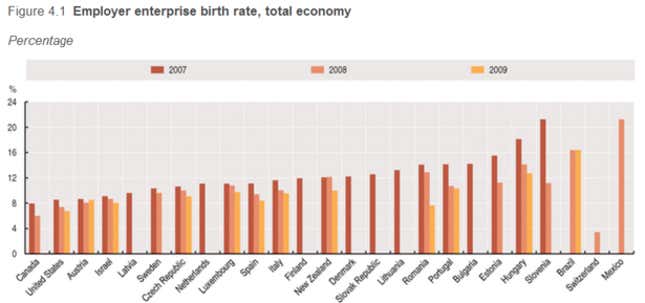
There isn’t a whole lot in common between the countries that outperform us. Sweden is a wintery, socialist wonderland. Brazil is the growth powerhouse of the tropics. Israel has a giant public sector, but prides itself on its tech scene. Italy and Spain are the Latinate basket-cases that might bring down the euro. All told, it’s hard to draw any overarching conclusions about why all these places finish ahead of the U.S. The countries that fare best on this measure tend to be poorer, which may simply mean that it’s easier for them to grow since they’re starting with a smaller corporate base. Yet that doesn’t explain away our ranking vis a vis wealthy nations such as Sweden, Austria, or the Netherlands.
New Businesses Don’t Make Up a Large Portion of Our Jobs
The U.S. does produce proportionately more large start-ups than its peers nations, according to the OECD, and new businesses have a much better than average chance of surviving at least two years here. But they don’t appear to play a uniquely large role in job creation. According to Marion Ewing Kauffman Foundation, brand newborn companies were responsible for about 3 percent of all U.S. jobs in 2005. By 2008, it was closer to two percent. In either case, that would place us toward the middle or bottom of the OECD rankings shown below — leaving us in the range of Finland and Sweden.
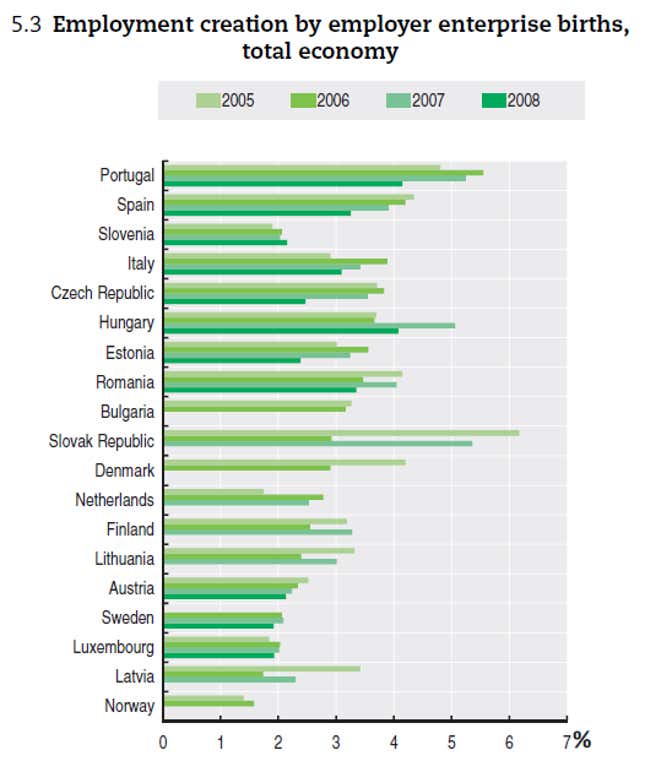
In short, start-ups with employees aren’t a particularly large part of America’s corporate landscape, nor do they add much more to employment here than anywhere else. What makes this situation even more remarkable is that, unlike some other countries, the US has many, many small businesses where the only “employee” is also the owner. Freelancers, consultants, one-man-band landscapers, and the like often incorporate for liability and tax purposes. As the OECD notes, that should inflate our start-up rate.
There are some studies of global entrepreneurship where the US leads the pack. When the World Bank tallied up the average number of newly registered limited liability companies across the globe between 2005 and 2009, it found we had one of the highest startup rates per 1,000 people, in a league with Canada, Australia, and the United Kingdom (as shown in the map below, where the darker blue a country is, the more new companies formed there).
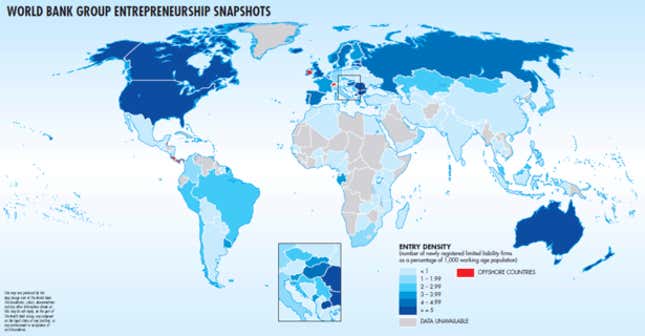
The U.S. also finished tops for entrepreneurial activity among advanced countries in the Global Entrepreneurship Monitor’s 2011 annual report, which makes estimates about start-up businesses formation across the world based on a 140,000 person survey. By their account, about 12 percent of U.S. adults run businesses that are less than three and a half years old, compared to 6.9 percent on average in other so-called “innovation-driven” economies. One reason this study might find such different results from the OECD is that the survey counts any kind of business, whether or not it pays employees, as entrepreneurial activity. That’s a big deal in the United States, where about three quarters of all firms have zero payroll. Those businesses often belong to self-employed individuals who haven’t needed to incorporate.
Starting Businesses Out of Desperation
Which brings us to one of the sadder realities of US entrepreneurship. According to GEM’s findings, a very high percentage of U.S. new business owners report starting their own companies not because they had a great, innovative idea or because they truly wanted to be their own boss, but out of necessity. There’s a disconcertingly large group of Americans who have gone to work for themselves only because nobody else will hire them.
That fact is illustrated below. The blue bars track entrepreneurship rates among all adults. The red lines track the percentage of entrepreneurs who created businesses because they lacked other options. In the US, those entrepreneurs make up about 21 percent of the total, putting us in a league with Greece, Spain, Ireland, and conglomerate cultures like Japan and South Korea.
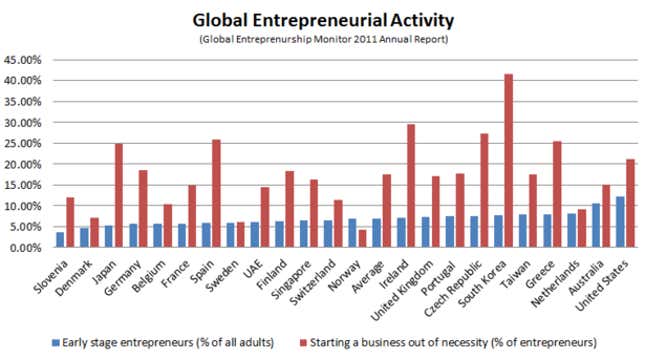
Hold on! you’ve probably said by now. So far, we’ve only talked about the sheer quantity of start-ups America produces versus other countries. What about the wonderful innovations they engineer?
Our Young Companies Aren’t Unusually Innovative
And you’d have a point. Some of the most cutting-edge young companies in the world call Silicon Valley, New York, and Boston, and Austin, Texas home, partly because we have the financial backers to support them. According to the OECD, the US ranks second overall in venture capital invested as a percentage of GDP, which wedges us between Israel at No. 1 and Sweden at No. 3. In sheer dollars, we dwarf everyone. That said, it’s not clear all that money floating around makes our start-ups much more creative. The OECD ranks us ninth out of 22 for the number of start-ups younger than five years old that issue patents, adjusted for the size of our economy (Denmark leads on that measure).
Nor do our entrepreneurs seem to consider themselves particularly innovative. About thirty percent of new business owners told GEM that they were marketing something that qualified as an innovative product, placing us in the middle of the advanced economy pack (on the right in the graph below, which you can click for a much larger version). This result might be a function of the fact that the U.S. already has so many businesses. For the purposes of the survey, an innovation just meant something new to the local market, meaning a great Jewish deli, for instance, might count as an innovation in Taiwan, but not in the United States. Then again, France has a lot of businesses too, and they outrank us. The results certainly don’t give us any reason to think U.S. start-ups systematically out-innovate their international cousins.
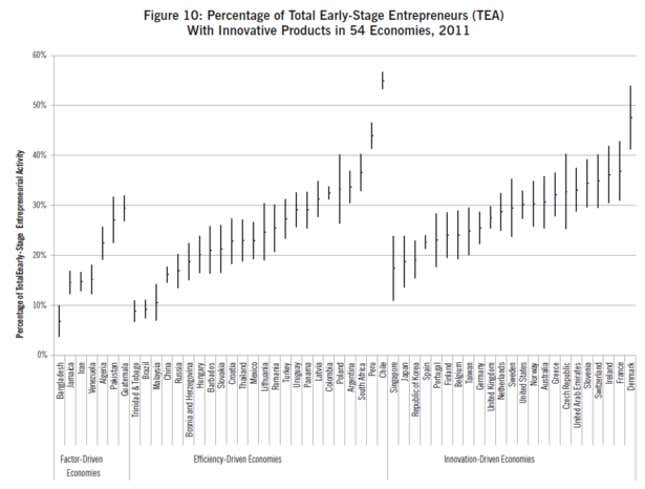
Perhaps all of this might seem a bit nit-picky to. So we’re not the most entrepreneurial nation. So our start-ups aren’t unquestionably the most innovative. Americans still has a fairly strong, if weakening, tradition of creating businesses from scratch and trying to support those who do. But here’s the what’s important to remember: we don’t have a monopoly on entrepreneurship. Many other economies — all with different tax structures, safety nets, and regulatory regimes — seem to be just as exceptional as we are.
Also on our sister site The Atlantic:
What’s really eating the family budget? It ain’t smartphones